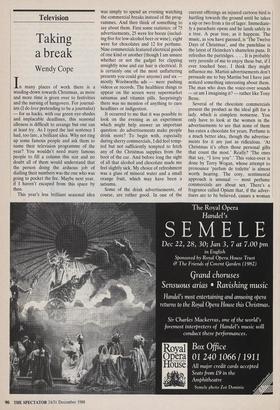Television
Taking a break
Wendy Cope
In many places of work there is a winding-down towards Christmas, as more and more time is given over to festivities and the nursing of hangovers. For journal- ists (I do love pretending to be a journalist) — for us hacks, with our green eye-shades and implacable deadlines, this seasonal idleness is difficult to arrange but one can at least try. As I typed the last sentence I had, too late, a brilliant idea. Why not ring up some famous people and ask them to name their television programme of the year? You wouldn't need many famous people to fill a column this size and no doubt all of them would understand that the person doing the arduous job of dialling their numbers was the one who was going to pocket the fee. Maybe next year, if I haven't escaped from this space by then.
This year's less brilliant seasonal idea was simply to spend an evening watching the commercial breaks instead of the prog- rammes. And then think of something to say about them. First some statistics: of 75 advertisements, 25 were for booze (includ- ing five for low-alcohol beer or wine), eight were for chocolates and 12 for perfume. Nine commercials featured electrical goods of one kind or another (though I am unsure whether or not the gadget for clipping unsightly nose and ear hair is electrical. It is certainly one of the most unflattering presents you could give anyone) and six — mostly Woolworths ads — were pushing videos or records. The healthiest things to appear on the screen were supermarket satsumas and vitamin pills. Surprisingly there was no mention of anything to cure headlines or indigestion.
It occurred to me that it was possible to look on the evening as an experiment which might help answer an important question: do advertisements make people drink more? To begin with, especially during sherry commercials, I did feel temp- ted but not sufficiently tempted to fetch any of the Christmas supplies from the boot of the car. And before long the sight of all that alcohol and chocolate made me feel slightly sick. My choice of refreshment was a glass of mineral water and a small orange fruit, which may have been a satsuma.
Some of the drink advertisements, of course, are rather good. In one of the current offerings an injured cartoon bird is hurtling towards the ground until he takes a sip or two from a tin of lager. Immediate- ly a parachute opens and he lands safely in a tree. A pear tree, as it happens. The music, as you have guessed, is 'The Twelve Days of Christmas', and the punchline is the latest of Heineken's shameless puns. It refreshes the partridges. . . . It is probably very juvenile of me to enjoy these but, if I ever touched beer, I think they might influence me. Martini advertisements don't persuade me to buy Martini but I have just noticed something interesting about them. The man who does the voice-over sounds — or am I imagining it? — rather like Tony Benn.
Several of the chocolate commercials present the product as the ideal gift for a lady, which is complete nonsense. You only have to look at the women in the advertisements to see that none of them has eaten a chocolate for years. Perfume is a much better idea, though the advertise- ments for it are just as ridiculous. 'At Christmas it's often those personal gifts that count the most.' Really? The ones that say, "I love you".' This voice-over is done by Terry Wogan, whose attempt to pronounce 'parfum de toilette' is almost worth hearing. The cosy, sentimental approach is unusual — most perfume commercials are about sex. There's a fragrance called Opium that, if the adver- tisers are to be believed, causes a woman to lie back on the sofa, panting with lust, and caress her own neck. If somebody gives you a bottle of that for Christmas, watch out. If he is drenched in an equally exciting male fragrance — Mandate, perhaps, or Sybaris or Adidas — resistance may be impossible. Except that in reality you will both be zonked out on pudding and surrounded by relatives. There was very little emphasis, in any of the commer- cials, on the joy of a family celebration. Unlike politicians, advertisers seem to know they won't sell us anything by going on about that.











































































































 Previous page
Previous page